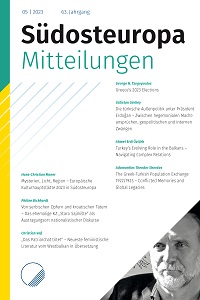The Greek-Turkish Population Exchange 1922/1923: Conflicted Memories and Global Legacies
The Greek-Turkish Population Exchange 1922/1923: Conflicted Memories and Global Legacies
Author(s): Adamantios SkordosSubject(s): Politics / Political Sciences, History
Published by: Südosteuropa Gesellschaft e.V.
Keywords: Greece; Turkey; Greek Orthodox population; Exchange of Greek and Turkish Populations;
Summary/Abstract: The collective memory of the “Asia Minor Catastrophe” is omnipresent in modern Greece. The term refers to the expulsion of the Greek Orthodox population from Asia Minor in September 1922 as result of the lost war against Turkey (1919 – 1922). This violent displacement was made subsequently legal by the Convention Concerning the Exchange of Greek and Turkish Populations, signed at Lausanne 30 January 1923, as part of the Lausanne Peace Treaty. In Turkey’s official culture of remembrance and politics of history, the exodus of over a million Orthodox Christians from Asia Minor and the following Lausanne Convention is overshadowed by the “liberation of Izmir” by Kemal Atatürk. Although the Treaty of Lausanne was not the first interstate population exchange agreement in modern history, its impact at the global level was unprecedented. In the decades that followed, up to the end of the Cold War, the alleged “success story” of the Greek-Turkish population exchange was repeatedly invoked to justify and enforce large-scale population resettlements for the purpose of national homogenization projects.
Journal: Südosteuropa Mitteilungen
- Issue Year: 63/2023
- Issue No: 05
- Page Range: 41-54
- Page Count: 14
- Language: English
- Content File-PDF

